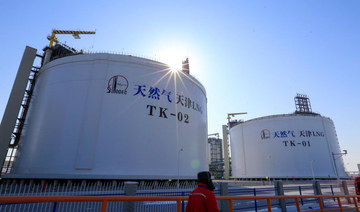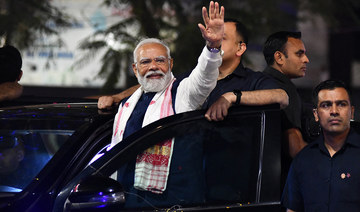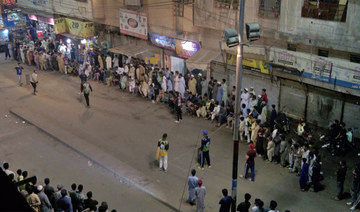JERUSALEM: An Israeli cabinet minister warned on Sunday of possible direct or proxy Iranian attacks on Israel should the stand-off between Tehran and Washington escalate.
The United States has increased economic and military pressure on Iran, with President Donald Trump on Thursday urging its leaders to talk to him about giving up their nuclear program and saying he could not rule out an armed confrontation.
Israeli Prime Minister Benjamin Netanyahu’s government, which supports Trump’s hard tack against its arch-foe, has largely been reticent about the spiralling tensions.
Parting with the silence, Israeli Energy Minister Yuval Steinitz said that, in the Gulf, “things are heating up.”
“If there’s some sort of conflagration between Iran and the United States, between Iran and its neighbors, I’m not ruling out that they will activate Hezbollah and Islamic Jihad from Gaza, or even that they will try to fire missiles from Iran at the State of Israel,” Steinitz, a member of Netanyahu’s security cabinet, told Israel’s Ynet TV.
Hezbollah and Islamic Jihad are Iranian-sponsored guerrilla groups on Israel’s borders, the former active in Syria as well as Lebanon and the latter in the Palestinian territories.
The Israeli military declined to comment when asked if it was making any preparations for possible threats linked to the Iran-US standoff.
Israel has traded blows with Iranian forces in Syria, as well as with Hezbollah in Lebanon and Palestinian militants. But it has not fought an open war with Iran, a country on the other side of the Middle East.
Iran may attack Israel if US standoff escalates: Israeli minister
Iran may attack Israel if US standoff escalates: Israeli minister

- The US has increased economic and military pressure on Iran
- Donald Trump urged its leaders to talk to him about giving up Iran's nuclear program
UAE jiu-jitsu team eye fourth consecutive Asia title

- Eighth edition of the Jiu-Jitsu Asian Championships will run from May 3-8 at Mubadala Arena in Abu Dhabi
ABU DHABI: The adult UAE Jiu-Jitsu national teams are looking to claim a fourth consecutive title at the eighth Jiu-Jitsu Asian Championships set to take place at Abu Dhabi’s Mubadala Arena from May 3 to 8.
The championships will have more than 1,500 athletes competing from over 30 countries.
Competitions for adults will run from May 3 to 5, while the Asian Youth Championship — a new addition this year — will be held from May 6 to 8.
The UAE were crowned champions in the last edition held in Bangkok last year.
The youth team are eyeing the inaugural title, building on their success from last year at the 28th Jiu-Jitsu World Championship in Kazakhstan.
Mubarak Al-Menhali, director of the technical department at the UAE Jiu-Jitsu Federation, said: “We are providing the team with all the support they need as they prepare to defend the title. We have full faith in their capabilities to deliver valiant performances, as they have done in the past few years, positioning themselves as continental champions.”
“The skills and determination displayed by our heroes is a result of the limitless support of the wise leadership, the continuous efforts of the UAEJJF, their endless passion, and the continuous encouragement from Emirati fans.”
Ramon Lemos, head coach of the national team, said: “Our athletes have consistently been adhering to the technical team’s instructions and plans, translating them into results, bringing in medals and titles. They are fully committed, focused, and more determined than ever, and we are confident that they are capable of clinching the title again.”
Ibrahim Al-Hosani, coach of the youth team, said: “Many of the male and female athletes taking part in the competitions of the Asian Youth Championship are emerging stars who are well-prepared to win titles and take the UAE’s journey of success in jiu-jitsu forward. We have full confidence in their abilities to shine and make history by becoming the first to achieve the title of the Jiu-Jitsu Youth Asian Championship.”
Khaled Al-Baloushi, a member of the national team, said: “This time I am stepping onto the mats as a brown belt holder, which is the result of 13 years of hard work and continuous training. I am fully aware of the responsibility entrusted to me, and I am more determined than ever to perform well and make the nation proud.”
Second Ritz-Carlton Reserve in Saudi Arabia planned for Neom
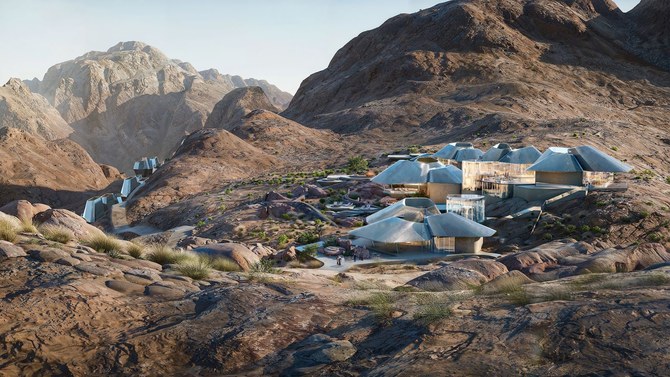
DUBAI: Marriott International, Inc. announced on Thursday that it has signed an agreement with Neom to open its second Ritz-Carlton Reserve in Saudi Arabia.
The hotel is anticipated to open in Trojena, a year-round mountain destination located in the northwest region of the country.
The resort is expected to feature 60 expansive one-to-four-bedroom villas. Plans also include a range of amenities including a spa, swimming pools and multiple culinary venues.
Chadi Hauch, the regional vice president of Lodging Development Middle East, Marriott International said in a statement: “Together with Neom, we look forward to bringing this ultra-luxury experience to Trojena. This signing also marks an important addition to our portfolio in Saudi Arabia where we continue to see a strong demand for our luxury brands.”
“Trojena is a rare destination, and we are delighted that Ritz-Carlton Reserve has hand-picked the mountains of Neom for their next property. Together we will create an experience that can’t be recreated anywhere else. Our visitors and residents will experience a sanctuary that will capture the magic of Saudi Arabia, embracing ultimate luxury in an unforgettable location,” executive director and Trojena region head Philip Gullett said in a statement.
Trojena, one of the flagship developments within Neom, is being developed and positioned as a year-round adventure sports destination that will include activities such as skiing, water sports, hiking and mountain biking. It will also include apartments, chalets, retail, dining, entertainment, leisure, sports and recreational facilities, and other hospitality offerings, including a W Hotel and a JW Marriott Hotel.
Ritz-Carlton Reserve currently boasts a collection of only six properties in destinations including Thailand, Indonesia, Puerto Rico and Mexico.
Saudi cultural attache in Japan receives Jeddah University delegation

DUBAI: Saudi Arabia’s cultural attache in Japan hosted on Thursday a delegation from Jeddah University, led by the institution’s Vice President for Academic Affairs and Development Dr. Monagi bin Hassan Al-Kanaani.
Dr. Anas Ahmed, Jeddah University’s dean of the College of Engineering, and Dr. Mohammed Kalkatawi, director of the Data Management Office at the institution, were part of the delegation.
زار الملحقية الثقافية السعودية في #اليابان وفداً من #جامعة_جدة يرأسهم سعادة د. مناجي بن حسن الكناني وكيل الجامعة للشؤون الأكاديمية والتطوير ويرافقه سعادة د. أنس أحمد عميد كلية الهندسة و د. محمد كلكتاوي مدير مكتب إدارة البيانات بالجامعة خلال زيارتهم لليابان. pic.twitter.com/Cw72aLimXL
— الملحقية الثقافية السعودية في اليابان (@SaudiCultureJP) April 25, 2024
Badr Al-Otaibi, director of the office of the Saudi Arabia cultural attache in Japan, received the delegation.
The officials discussed their visits to several Japanese universities to explore cooperation opportunities and sign student-exchange agreements.
Oil Updates – crude steady as market weighs US demand concerns, Middle East conflict risks

SINGAPORE: Oil prices steadied on Thursday after settling lower in the previous day, as signs of retreating fuel demand in the US, the world’s biggest oil user, contended with widening conflict risks in the key Middle East producing region, according to Reuters.
Brent crude futures inched up 18 cents, or 0.2 percent, to $88.20 a barrel at 9:30 a.m. Saudi time, while US West Texas Intermediate crude futures gained 13 cents, or 0.2 percent, to $82.94 a barrel.
Data from the US Energy Information Administration on Wednesday showed that gasoline stockpiles fell less than forecast while distillate stockpiles rose against expectations of a decline, reflecting signs of slowing demand.
The falling fuel demand is occurring amid signs of cooling US business activity in April and as stronger-than-expected inflation and employment data means the US Federal Reserve is more likely to delay expected interest rate cuts, weighing on economic sentiment.
“The current weakness in benchmark prices, after testing above $90 (a barrel) levels, is due to market sentiment refocusing on global economic headwinds over geopolitical tensions,” said Emril Jamil, senior oil analyst at LSEG Oil Research.
Geopolitics aside, prices this quarter will be driven by factors including major producer supply cuts, economic data out of China and Eurozone, on top of incremental demand expectations as the Northern Hemisphere heads into summer amid expected tighter supply, said Jamil.
A better indication of the Fed’s rate intentions will be seen after US gross domestic product and March personal consumption expenditure data is released on Thursday and Friday.
Meanwhile, fighting in the Gaza Strip between Israel and Hamas is expected to expand as Israel may start an assault on Rafah, in the enclave’s south, which may increase the risk of a wider war that could potentially disrupt oil supplies.
However, there have been no other signs of direct conflict between Israel and Hamas-backer Iran, a major oil producer, since last week.
“Tensions between Iran and Israel have eased, but Israeli attacks on Gaza are expected to worsen, and the risk of conflicts spreading to neighboring countries is underpinning oil prices,” said Toshitaka Tazawa, an analyst at Fujitomi Securities Co. Ltd.
Other EIA data on Wednesday showed that crude stocks slumped by 6.4 million barrels to 453.6 million barrels, compared with expectations in a Reuters poll for an 825,000-barrel rise.
Cricket facing its own climate test
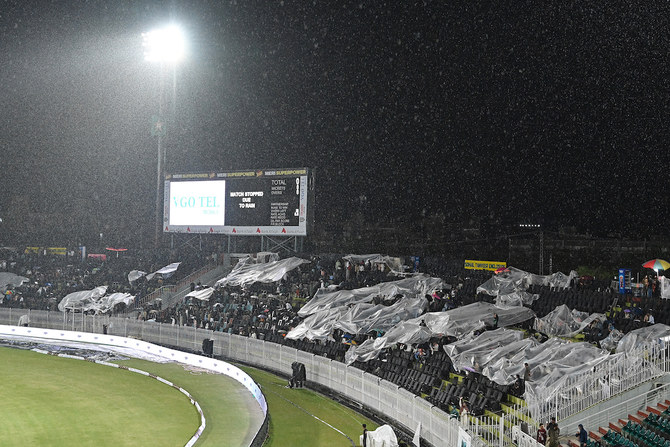
- With international cricket played throughout the year, the probability of matches being affected by adverse weather has increased
Rain is the scourge of cricket. It has the capacity to whip up conflicting feelings. Players may feel that it has rescued their team from looming defeat or denied them of certain victory.
Spectators may feel the same way but will not have the cover of a pavilion or dressing room in which to shelter. Furthermore, they are likely to feel deprived of part of their entrance fee. These feelings used to be commonly associated with cricket in the British Isles. This may still linger, given the wet start to the 2024 county cricket season, but it is no longer universally the case.
In the UAE, of all places, a year of rain is reported to have fallen in 24 hours, from late Monday to Tuesday. At 3 p.m. on Monday it was as dark as the night. Some reports suggested that cloud seeding was the cause, but why might that have been deployed at that time of year? The EU’s Copernicus Climate Change Service reports that the Earth recorded its hottest March on record, the 10th consecutive month to reach that feat. These all-time monthly highs were observed both in the air and in water. The Copernicus report judged that the temperatures were the result of decades of human-caused warming and El Nino climate patterns.
Obtaining a consensus on the causes seems beyond reach, although data points to an extraordinary surge in temperatures around the planet. This may stop once El Nino patterns end and temperatures cool. It is not yet possible to know if a fundamental shift has occurred in the Earth’s climate. In this uncertain moment, longer-term decisions have to be made by those responsible for running cricket.
An example of this is real in Worcester, England. Since 1896, Worcestershire County Cricket Club’s home has been at New Road, nestling under the watchful eye of the neighboring cathedral. This provides it with iconic status in the eyes of the cricketing world. The ground also sits on the west bank of the River Severn which, in recent years, has flooded with increasing regularity. This season, the county’s first two matches cannot be played there because the ground has not recovered from the winter’s flooding. Instead, they will be played at Kidderminster, 25km north.
The increased frequency and severity of flooding is causing the club’s management to assess alternative options to sustain its future. Amongst these are improved flood-alleviation measures and a move away from New Road, a prospect that is anathema to many supporters. The city is mindful of what happened to its soccer and rugby teams. The former moved grounds in 2013, resulting in a nomadic existence for a decade and a drop of three levels in the game’s pyramid. Its rugby team entered receivership in October 2022.
This sorrowful tale, thrown into stark perspective for Worcestershire CCC by adverse climate events, differs from the effects of adverse weather in other parts of the world. In the UAE, the effects were to cause the cancellation of a quadrangular tournament between the women’s T20 teams of the UAE, the US, the Netherlands and Scotland in Abu Dhabi. This was planned as a warm-up event before the ICC women’s T20I qualifying tournament in Abu Dhabi, set to open on April 25. Players have been deprived of valuable match practice, but that deprivation pales against that suffered by local residents.
During the Asia Premier Cup in Oman, there was rain, not of UAE proportions, but sufficient to disrupt some matches. The urbane curator of south Indian descent, Annop C Kandy, remarked that he had rarely seen rain in his eight years in charge and would normally expect temperatures in the 40°C range during April — an antidote to notions of a warming planet. He also revealed that whatever rain did fall came from the west and was short-lived. Unusually, this rain was from the south and southeast.
It caused much work for the curator and his staff, who coped admirably, notably when placing covers over the pitches during heavy windy conditions. Six of the 24 matches were shortened, two to 18 overs, two to 15 overs, one to 11 overs and one to eight overs. The last one affected Saudi Arabia and Nepal, with the latter winning with four balls to spare. It will never be known how the match would have played out if 20 overs had been possible.
Given that international cricket is now played around the world throughout the year, it should be no surprise that the probability of matches being affected by adverse weather has increased. It also seems that the severity of the impact is increasing. A recent example of this has occurred in Scotland. Unprecedented poor weather delayed pitch preparation at a ground near Dundee where a Cricket World Cup League 2 tournament between Scotland, Namibia and Oman was postponed. Originally due to take place between May 2 and 12, it is now scheduled for July, with the agreement of the three countries and the International Cricket Council.
It should not be forgotten that the 2023 Indian Premier League final was affected by rain in Ahmedabad. The match was originally scheduled to be played on May 28, but was postponed to the reserve day, May 29. This was the first time that the IPL final had been postponed because of adverse weather. Chennai Super Kings’ response was delayed for over an hour by rain and then the target adjusted with the innings being reduced to 15 overs. This outcome for a showpiece final was not ideal.
Although rain is regarded as cricket’s traditional bete noire, other climate issues have begun to be felt. During the ODI World Cup in India last November, extreme heat levels affected players, as did very high levels of air pollution, especially in Delhi. Cricketers and their administrators can do little to prevent the causes of these problems. What they are faced with is the need to devise and adopt measures which ameliorate the impact of climate issues and enhance the game’s sustainability. This may be about to get more difficult.




